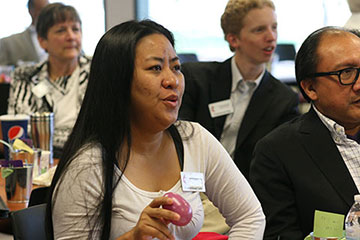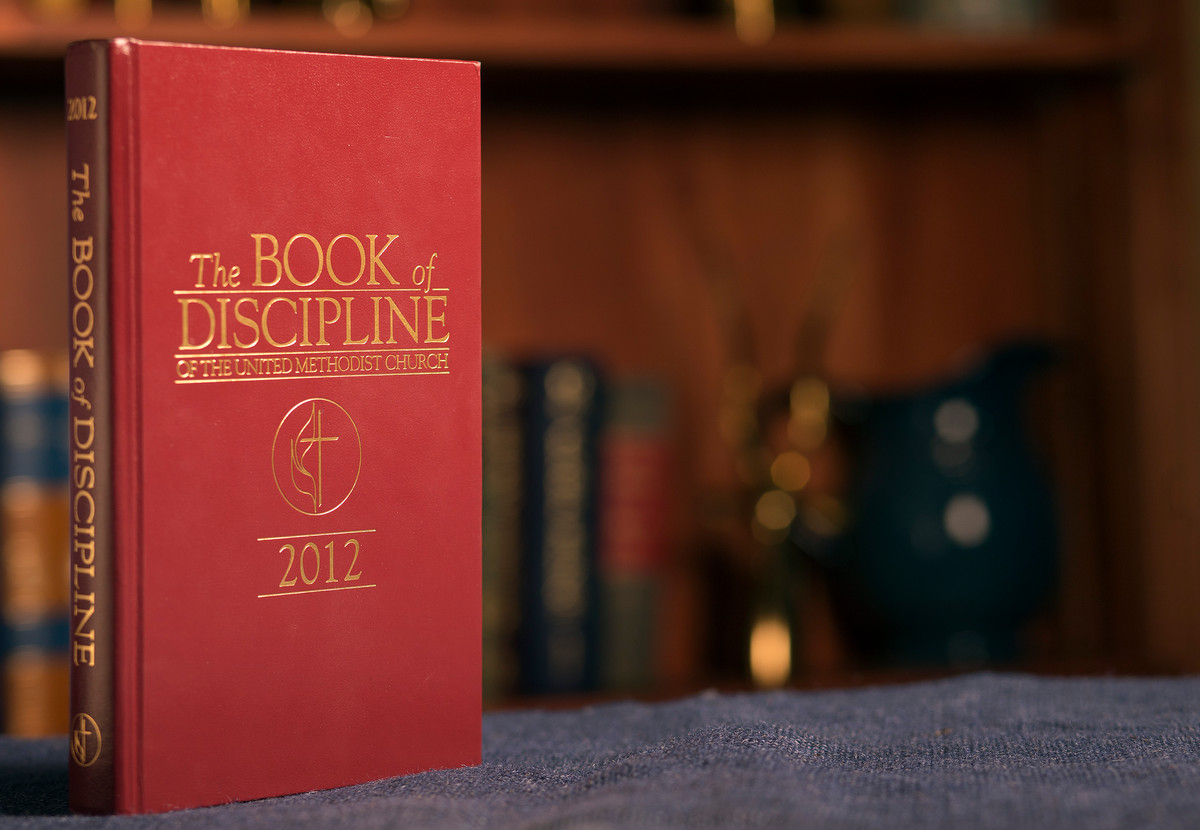Editor's note on July 31, 2014: At this point, at the behest of the Connectional Table, the United Methodist Board of Church and Society is beginning consultations on the Social Principles.
Here's a quick test of your United Methodist knowledge:
- Would The United Methodist Church endorse a church-run bingo night?
- Does the denomination support the government subsidizing health care?
- Would the denomination approve of shooting down a nuclear missile from orbit?
Answers to these questions and others about church teachings are in the Social Principles, part of the United Methodist Book of Discipline.
As their preface says, the Social Principles are meant to serve as the denomination's "prayerful and thoughtful effort ... to speak to the human issues in the contemporary world from a sound biblical and theological foundation as historically demonstrated in United Methodist traditions."
General Conference — the global gathering that is the only body that can speak for the denomination —is responsible for approving the contents of the Social Principles as well as the rest of the Discipline.
The United Methodist Board of Church and Society is charged with advocating for the Social Principles and the General Conference-approved resolutions. The agency's advocacy on matters such as immigration reform, gun control, tobacco use and health care all stems from the denomination's Social Principles.
But over the years, some United Methodists have criticized the principles as too expansive and too U.S.-centric.
2012 General Conference approves undertaking
The 2012 General Conference took up a petition from the denomination's three central conferences in Europe to revise the Social Principles with the goal of making them "more succinct, theologically founded and globally relevant." The General Conference, by a vote of 589 to 319, referred the matter, and it's now before the Connectional Table.
At its April 29-May 1, 2013, meeting in Chicago, the denomination's Connectional Table approved a preliminary proposal to initiate that process. The Connectional Table coordinates The United Methodist Church's mission, ministry and resources.
"Any process to revise the Social Principles should be extremely transparent, engage in as much communication as possible and be thoroughly debated across the connection," the proposal says.
With that in mind, the proposal calls first for listening and addressing questions about the Social Principles. The proposal garnered the unanimous support of the Connectional Table voters.

Riva Ruth Tabelisma, a Connectional Table member from the Philippines, joins in morning worship at the Connectional Table meeting May 1, 2013, in Chicago. A UMNS photo by Heather Hahn.
The Rev. Harald Rückert, a Connectional Table member and United Methodist pastor in Reutlingen, Germany, said the proposal is of very great interest in Europe and likely other parts of the world.
"We are known as the only church in Germany that has a Social Creed and that has Social Principles," he said. "We are so proud of it. ... But sometimes when people look into (our Social Principles), it gets a little tough because there is so much in it which doesn't fit Germany because it is related to the U.S."
He added that he is proud the Connectional Table is taking the first steps toward revision.
Plan details
Under the plan, church leaders would host "symposia" for United Methodists around the globe — three in Africa, one in Europe, one in the Philippines and now two in the United States. Each symposium would include a panel of participants, allow for public hearings, use live streaming and provide opportunities for questions from interested United Methodists using mail, email and Twitter.
Each symposium would last at least two days. Among the participants would be United Methodist theologians and representatives from United Methodist schools.
Among the questions the process will tackle:
- What is the nature of the Social Principles?
- What is the relationship between Social Principles and the Book of Discipline?
- What is the relationship between Social Principles and the Book of Resolutions, which outlines the denomination's social teachings?
- What do Social Principles for the whole global United Methodist Church look like?
- How shall they be used across the connection?
- How shall they be applied in different regions?
The Connectional Table expects to take up a final proposal and funding plan for the symposia at its next meeting in November. The majority of financial support likely will come from the contingency funds the body oversees, but it also expects to share expenses with other cooperating groups in the church.
At the conclusion of the symposia, the goal is to complete an evaluation that determines whether the process should be continued and, if so, to make a proposal for that continuation to the 2016 General Conference.
"This will not be a proposal for a final global Social Principles," said the Rev. Kennetha Bigham-Tsai, a Connectional Table member and pastor of Milwood United Methodist Church in Kalamazoo, Mich. She presented the plan to the Connectional Table.
She said she expects the process of proposing revisions to take at least eight years. She also told those gathered that the process will involve the Council of Bishops, particularly members from outside the United States, as well as the Board of Church and Society.
The process also will include representatives from denominations that have some form of historical connection with The United Methodist Church, such as the affiliated, autonomous Methodist denominations in other countries.
Challenges facing the Social Principles
The Rev. Neal Christie, a Board of Church and Society executive, leads workshops and mentors others to educate about the Social Principles around the globe. With help from his agency, the Social Principles are available in at least 10 languages, including Russian, Spanish, Swahili and Tagalog.
Despite these efforts, he said, he expects the main problem the Social Principles face is that many United Methodists still are unfamiliar with their contents or that the denomination even has a declaration of its social teachings. Often pastors don't discuss them, and even United Methodist seminaries don't spend much time on them, Christie said.
"We reprint the Bible; we need to reprint the Social Principles in all the languages we can, even for oral cultures," he said. "We need to invest in distributing them. We need to have people trained to discuss them in a participatory way."
He said the more access United Methodists have to the document, the better off the church will be.
Perhaps the most well known and contentious Social Principle deals with human sexuality.
The principle notes "all persons are individuals of sacred worth," but "The United Methodist Church does not condone the practice of homosexuality and considers this practice incompatible with Christian teaching."
The principle also asserts that "sexual relations are affirmed only with the covenant of monogamous, heterosexual marriage."
But even that principle may be too U.S.-centric, said Benedita Penicela Nhambiu, a Connectional Table member from the Mozambique South Annual (regional) Conference. She is also a member of the Standing Committee on Central Conference matters.
She told United Methodist News Service that polygamy remains "a big debate" in Africa and other parts of the world. The Social Principles do not directly address that debate.
Christie noted that the legislation at the 2012 General Conference asks that the Social Principles be revised, not rewritten.
"That can certainly become a reality," he said. "How the church does this matters. Why we do this really needs to be made clear. Are they global? The General Conference when they voted on them in 2012 already makes them global. Can more clarity be brought to some of the language? Of course. And that comes through changing them through the legislative process at General Conference and that includes taking the petition seriously and prayerfully through the process the Connectional Table now will put into place."
Long-term process
The Rev. L. Fitzgerald "Gere" Reist II, secretary of the General Conference, told the Connectional Table the effort to make the Social Principles truly global is "a massive undertaking."
Quiz answers
- Gambling - As an act of faith and concern, Christians should abstain from gambling and should strive to minister to those victimized by the practice.
- Right to health care - We believe it is a governmental responsibility to provide all citizens with health care.
- Space - We ... reject any nation's efforts to weaponize space and urge that all nations pursue the peaceful and collaborative development of space technologies and of outer space itself.
To learn more, view summaries of the denomination's Social Principles.
That 1908 social creed, the first by any denomination, was updated in 1972 by General Conference. Before the centennial of the original Social Creed in 2008, the United Methodist Board of Church and Society led a similar global process to revise the 1972 creed into more globally resonant language. The 2008 General Conference approved that revision as a "Companion Litany to the Social Creed."
"Our Social Creed" appears at the end of the Social Principles in the Book of Discipline (166). It remains a series of affirmations on which the rest of the principles expand, Christie explained.
"I can only say that the questions before us offer a new experience, a new opportunity and a great challenge," he said. "We need to hear not just from United Methodists but we need to hear from other religious bodies with which we connect. ...We need to make sure that nothing that is in one region of the church is determined for all regions of the church."
Christie contends both the Social Creed and the more detailed Social Principles serve a purpose.
"You can make the argument: Why do we have the Social Principles when we have a Social Creed?" Christie said. "So in whose interests is it to have the Social Principles? I would argue it's in all our interests because we need to flesh out what the creed says."
Reist told the Connectional Table that he hopes a significant revision of the Social Principles would be vetted at each United Methodist annual conference around the world before being taken up by the General Conference.
*Hahn is a multimedia news reporter for United Methodist News Service.
News media contact: Heather Hahn, Nashville, Tenn., (615) 742-5470 or newsdesk@umcom.org.
Like what you're reading? Support the ministry of UM News! Your support ensures the latest denominational news, dynamic stories and informative articles will continue to connect our global community. Make a tax-deductible donation at ResourceUMC.org/GiveUMCom.




